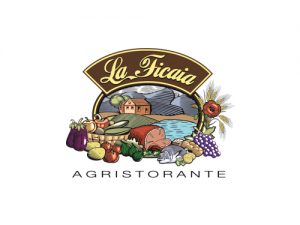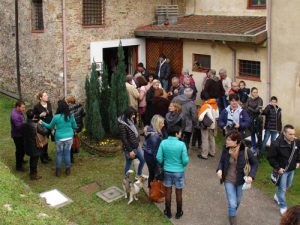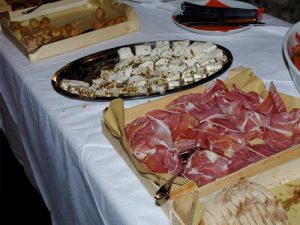The agri-restaurant “La Ficaia”, located in in the north of Tuscany, is a small restaurant managed by the local as- sociation of women farmers “Donne in campo”. The farmers of this association created an agri-catering company in 2012 and subsequently, in 2015 they converted an old abandoned house into an agri-restaurant. Both initiatives use ingredients produced on 10 farms. Recently there was a change in the management structure, a movement away from the Association to a new company created by two farmers. The agri-restaurant is open only during the weekend, with dinner on Friday and Saturday evenings and lunch on Sunday. Four farmers are directly involved in this restaurant enterprise.
Area:
The products offered in the restaurant originate from 10 farmers, with eight situated in the locality. The main prod- ucts include: meat (lamb, pork, beef, chicken and rabbit); sheep cheese; seasonal vegetables; flour from different cereals; oil; and wine. The products suppliers are all small farmers (average 5 Ha) with the majority growing or rearing their produce organically.
The main learning element which emerged from this type of cooperation, concerns the identification of innovative solutions to combat the continuous fluctuations of global commodity prices and to provide easier access to the marketplace. In the context of unsustainable and subsistence agricultural conditions, as a consequence of having small farms located in mountainous areas, it is really very difficult for the holdings to be financially viable. The idea of agri-restaurant was elaborated from the farmers associated with the woman’s association of Lucca, as a way to solve their difficulties to sell products. This cooperation allowed the farmers to
- Sell directly the products of this group of small farms
- Valorize the professional skills of woman in the kitchen activity
- Obtain added value thus increasing their income
The management of the agri-restaurant is entrusted to two farmers, while the other farmers involved sell and bring their products to the restaurant.
The challenge of this original form of cooperation is to valorize the local products through a gastronomic activity, totally based on farmers’ products, creating a target for clients interested in local consumption. The daily challenge of farmers involved is to learn, step by step, a new profession requiring many activities in order to manage:
- Products (purchasing, storage),
- Clients (reservations, service)
- Administrative obligations with respect to establishing a catering establishment had to be respected.
The management of the enterprise is undertaken by two farmers, one produces fresh vegetables and the other being a honey producer. The average annual revenue of the restaurant is approximately 20,000 – 25,000 Euro.
The main skills required for starting up in this form of cooperation relate to developing sufficient knowledge about
- Cooperation systems in agriculture, in terms of advantages/critical points pertaining to the different types in existence in Italy.
- Rules regulating this form of cooperation: legal framework, administrative management.
- Network management: starting from a positive attitude in a professional relationship. The farmer (female) involved in this project developed special skills and competencies in network management, very important for developing an internal harmony in the work environment; and logistical and administrative management especially forging relation- ships with farmers producing the products / ingredients.
The management of a restaurant also requires specific skills related to:
- Culinary and Catering: The competencies in this field are mainly transferred from tradition, but to manage an activ- ity for external clients, requires knowledge in the preparation and presentation of typical dishes
- Safety and hygienic treatment of food: indepth training is required to avoid to meet all relevant health and safety regulations in relation to food production and storage
The main benefit for farmers participating in this cooperation experience is to valorize their products, reducing ‘food- miles’ within the supply chain and eliminating intermediary costs.
The critical point is that the restaurant, has not possibility to develop and increase its activity. The local production is not significant, therefore the restaurant cannot buy more quantities of products; the actual management, directly ensured by farmers, means that the the restaurant is only open during the weekend. The network represent a first experience of cooperation in such an agri-restaurant which is very interesting and innovative, but limited is scale.
Advantages and disadvantages associated with this type of activity include:
Advantages:
- Low management costs for farmers
- Limited risks and participants’ involvement (in terms of capital invested, constraints concerning production to sale to the restaurant)
- Good quality and Guarantee of products’ traceability, building trust among consumers, and encouraging them to focus on quality instead of quantity in their purchases
- Supporting business growth and sustainability of small farmers
Disadvantages:
- The small scale of the operation cannot ensure a high income, but only a supplementary income to the farmers involved in this activity.
Advice/Recommendation
According to Monica Palagi, one of the two farmers managing LA FICAIA, the following are key considerations:
"The Agri-restauration is an interesting perspective for farmers, but the management of this activity is not easy and requires a lot of competencies."
"The success of our cooperation is due to the strength connection with local agriculture, farmers and territory."
Queries/Questions
- What is your opinion of the valorization of local products through the establish- ment of a farm restaurant?
- Do you think that in your area a restaurant based on local traditional farms’ prod- ucts can be a profitable activity?



 Čeština
Čeština  English
English  Français
Français  Deutsch
Deutsch  Italiano
Italiano  Slovenščina
Slovenščina  Español
Español 



